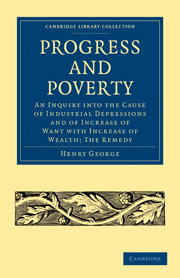 Progress and Poverty
Progress and Poverty Book contents
- Frontmatter
- PREFACE TO FOURTH EDITION
- Contents
- INTRODUCTORY
- BOOK I WAGES AND CAPITAL
- BOOK II POPULATION AND SUBSISTENCE
- Chapter I The Malthusian theory—its genesis and support
- Chapter II Inferences from fact
- Chapter III Inferences from analogy
- Chapter IV Disproof of the Malthusian theory
- BOOK III THE LAWS OF DISTRIBUTION
- BOOK IV EFFECT OF MATERIAL PROGRESS UPON THE DISTRIBUTION OF WEALTH
- BOOK V THE PROBLEM SOLVED
- BOOK VI THE REMEDY
- BOOK VII JUSTICE OF THE REMEDY
- BOOK VIII APPLICATION OF THE REMEDY
- BOOK IX EFFECTS OF THE REMEDY
- BOOK X THE LAW OF HUMAN PROGRESS
- CONCLUSION
- INDEX
Chapter I - The Malthusian theory—its genesis and support
Published online by Cambridge University Press: 07 September 2011
- Frontmatter
- PREFACE TO FOURTH EDITION
- Contents
- INTRODUCTORY
- BOOK I WAGES AND CAPITAL
- BOOK II POPULATION AND SUBSISTENCE
- Chapter I The Malthusian theory—its genesis and support
- Chapter II Inferences from fact
- Chapter III Inferences from analogy
- Chapter IV Disproof of the Malthusian theory
- BOOK III THE LAWS OF DISTRIBUTION
- BOOK IV EFFECT OF MATERIAL PROGRESS UPON THE DISTRIBUTION OF WEALTH
- BOOK V THE PROBLEM SOLVED
- BOOK VI THE REMEDY
- BOOK VII JUSTICE OF THE REMEDY
- BOOK VIII APPLICATION OF THE REMEDY
- BOOK IX EFFECTS OF THE REMEDY
- BOOK X THE LAW OF HUMAN PROGRESS
- CONCLUSION
- INDEX
Summary
Behind the theory we have been considering lies a theory we have yet to consider. The current doctrine as to the derivation and law of wages finds its strongest support in a doctrine as generally accepted—the doctrine to which Malthus has given his name—that population naturally tends to increase faster than subsistence. These two doctrines, fitting in with each other, frame the answer which the current political economy gives to the great problem we are endeavoring to solve.
In what has preceded, the current doctrine that wages are determined by the ratio between capital and laborers has, I think, been shown to be so utterly baseless as to excite surprise as to how it could so generally and so long obtain. It is not to be wondered at that such a theory should have arisen in a state of society where the great body of laborers seem to depend for employment and wages upon a separate class of capitalists, nor yet that under these conditions it should have maintained itself among the masses of men, who rarely take the trouble to separate the real from the apparent. But it is surprising that a theory which on examination appears to be so groundless could have been successively accepted by so many acute thinkers as have during the present century devoted their powers to the elucidation and development of the science of political economy.
- Type
- Chapter
- Information
- Progress and PovertyAn Inquiry into the Cause of Industrial Depressions and of Increase of Want with Increase of Wealth; The Remedy, pp. 81 - 91Publisher: Cambridge University PressPrint publication year: 2009First published in: 1881


